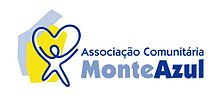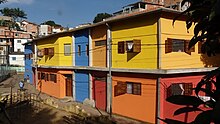Associação Comunitária Monte Azul
The aid organization Associação Comunitária Monte Azul in São Paulo , Brazil is a non-governmental organization that provides exemplary social work in three favelas in the southern zone. Since 1979 she has worked in the fields of education, culture and health care. Through political engagement she was able to advance the slum rehabilitation. With more than 250 employees, most of whom grew up in the favelas and live there, the project is now regarded as a successful example of sustainable development cooperation on an equal footing.
More than 1,350 children and young people receive educational support and training. The health center treats around 1,000 people annually. At Casa Angela, the center for humanized obstetrics, up to 30 children are born every month. In total, over 20,000 people benefit directly from the work of the Associação Comunitária Monte Azul . The aid organization became known internationally through book publications and lectures, as well as through the volunteers from all over the world, who take the impulse of humane treatment back to their homeland and are actively involved in social issues there.
history
The favela Monte Azul, with around 3,000 inhabitants today, was created in the 1960s as a result of the rural exodus that began at that time and massive immigration of agricultural workers from northeastern Brazil and the states of Minas Gerais and Paraná to São Paulo. The question "do you have something to give?" Asked the begging children at the front door of the Waldorf teacher Ute Craemer was a key experience. She initiated a project with her students from the Waldorf school in an upscale district of São Paulo for the favela children. It was supposed to raise social awareness and build bridges between the different social classes. The project included joint afternoon care in Ute's own house. In 1979 the Associação Comunitária Monte Azul was founded as a non-profit organization together with the favela residents. In the 1980s, the work was extended to the nearby Favela Peinha and the Horizonte Azul district on the southernmost outskirts of the city.
With its concept, Monte Azul is a successful example of development cooperation and a role model for many other social projects that have arisen and are being created in Brazil, for example the Paidéia theater project and the Aramitán cultural and social center in Sao Paulo or the NGO Associação Comunitária de Barra de Lama in Northeast Brazil.
education
In crèches, kindergartens, after-school care centers, vocational workshops and a Waldorf school, a total of around 1350 children, adolescents and young adults aged between four months and 21 years are cared for. The work is based on the principles of Waldorf education and anthroposophy. In addition, 80 people with disabilities are cared for in a social therapy workshop for young adults. The focus of the work is the holistic development of the human being. Not only children and young people, but also all employees are provided with education that enables them to shape their lives independently and with awareness of people and the environment.
Culture
By reviving and maintaining traditional culture, people's self-confidence is strengthened. The encounter with foreign cultures broadens the horizon, stimulates awareness and builds a culture of peace. The organization maintains theater and event rooms as well as libraries in all three centers to give people access to culture. A wide variety of advanced training courses, courses, theater and music events take place there. Around 600 people take part in these events every month. The organization also runs a music school in the Monte Azul favela, which enables 78 children and young people from the favela to learn a string instrument, play in an orchestra and sing in a choir. In the neighboring favela of Peinha, another music school was added in 2015, where 120 children are looked after.
Pedagogical training
Right from the start it was necessary to train and educate the employees, because they came from the favelas themselves. A structure of training and further education has thus developed that is now an integral part of Monte Azul. Around half of the 250 employees come from the favela.
There are regular training courses in Waldorf pedagogy, called Mainumby (Indian name for hummingbird): The Associação Comunitaria Monte Azul is the contact point for educationally and socially active people. Training courses, internships, elaboration of didactic material and pedagogical books, advice on organizational, professional and financial issues for social workers, support for university work, etc. a. are part of the educational offer. In cooperation with UNESCO , a project on environmental education and a pilot project to create women's cooperatives were developed. In addition, the employees, including those with university degrees, go through a "social apprenticeship" - according to the motto "learn by working and work by learning".
health
In the Ambulatório of the Favela Monte Azul, the residents of the Favela Monte Azul and the neighboring districts are z. T. treated free of charge. General practitioners, pediatricians, orthopedists, dentists and psychiatrists / psychologists can be consulted. In addition to scientific medicine, the treatments offer holistic approaches, particularly from anthroposophic medicine.
In Casa Angela , the birth center and center for mother-child health, women and their families are cared for around pregnancy, childbirth, puerperium and the first year of life of the child. Casa Angela is the first state-licensed birth house in Brazil and was accepted into the SUS public health system in 2015. On the one hand, Casa Angela tries to improve the extremely poor obstetric care for poor and low-income women. On the other hand, it offers an alternative for women from better social classes, in whom the rate of Caesarean sections is particularly high: In private clinics, 85 percent of children are born with a caesarean section. In public health hospitals, the proportion is 40 percent (FAZ July 9, 2015).
The Associação Comunitária Monte Azul is also a partner of the city of São Paulo for the Estratégia Saúde da Família program. She is responsible for the 1500 employees in 12 health posts and two special clinics in the southern São Luís district, where 300,000 people live. The program is designed to improve general health care for the population.
Environmental education
Environmental education was on the agenda very early on. Fruits and vegetables are grown in Horizonte Azul without the use of pesticides and delivered to the kitchens of the organization's educational facilities. This ensures a balanced and healthy diet for the children.
In organized community work, the residents cleared the favelas of rubbish, developed a rubbish separation system and drained sewage. Although there is no state separation of waste, the favela runs its own waste separation center, where waste collectors ( catadores ) can also hand in their waste. In this area, a collaboration in the field of waste research with the TU Berlin is planned.
Cultural Center
In all three areas of activity there are theater and dance performances, musical and other artistic performances. In the Centro Cultural Monte Azul , the residents of the favela and the neighboring residential areas put on their own performances. You can attend concerts, theater plays and shows by famous Brazilian and international artists; there are usually eight to ten performances a month. In addition to the performances, dance and sports courses are also held there. The Associação Comunitária Monte Azul engages theater educators and actors who rehearse plays with the favela residents in professional theater workshops and perform them twice a year.
Concept and leadership
Once a month, the 250 employees meet in one of the three favelas, mostly in the cultural center of Monte Azul, for employee training in the arts and for cultural exchange. Usually something from the Waldorf pedagogical work areas is presented and performed. New employees and new international volunteers are welcomed or bid farewell after their voluntary service. These regular meetings are intended to promote the community and the meaningful activities of the organization and to find new solutions to problems through creative activity. Every other week the employees of the favela meet in the afternoons for a similar program on a smaller scale. The organization is largely free of hierarchies and is managed in a kind of consensus procedure, i. H. all employees have a say in decisions and take responsibility. Aspects of " social sculpture " by Joseph Beuys and social threefolding by Rudolf Steiner are implemented in the organizational structure. In this sense, every employee is free in their respective work area to design it as they see fit. For this purpose, further training in Waldorf education is offered.
Awards
- ITAU UNICEF Prize 1995.
- Culture Prize of the City of São Paulo 1995.
- Goodwill Legion Fraternity Prize, Brasilia 1996.
- Efficiency Prize (Kanitz Foundation, Brazil 1997)
- Prize of the German Pestalozzi Foundation, 1997.
- Coca-Cola Prize for Youth Theater, 1998.
- 1998 Brazilian Government Criança Cidadã Prize.
- Ashoka Prize for Innovative Ideas, Brazil 1998.
- Prêmio Criança da Abrinq, 1998.
- Paul Harris Fellow Prize (Rotary Club)
literature
- Dunja Batarilo: The bridge builder. How Ute Craemer transformed the Monte Azul favela, ISBN 978-3-942073-28-8 .
- Ute Craemer, Renate Ignacio Keller: Transformar e possível . Editora Peirópolis, 2010, ISBN 978-85-7596-135-3 .
- Ute Craemer: Favela Monte Azul: hopes, goals, experiences. Social work in São Paulo. Free Spiritual Life Publishing House, 1987, ISBN 3-7725-0896-0 .
- Ute Craemer: Favela Children: Social Work on the Edge of Society: A Brazilian Diary. 4th edition Verlag Freies Geistesleben, Stuttgart 1987, ISBN 3-7725-0732-8 .
- Angela Gehrke da Silva: As a midwife in Brazil. Urachhaus, 2003, ISBN 3-8251-7418-2 .
Web links
- Kai Schiller: How a German became a fairy godmother in a favela. Hamburger Abendblatt, June 3, 2014, accessed on September 17, 2014 .
- Official Brazilian site of AC Monte Azul
- German site of the Associação Comunitária Monte Azul
- Ute Craemer: The Utopia of Transformation
- Short biography Ute Craemer:
Individual evidence
- ↑ Information on freunde-waldorf.de , accessed on March 3, 2013.
- ↑ Aramitán ( Memento of December 8, 2014 in the Internet Archive )
- ↑ Associação Comunitária de Barra de Lama - Gameleira (PE) . In: Associação Comunitária de Barra de Lama - Gameleira (PE) .
- ↑ Lap's go project . In: Developing Cooperation .
Coordinates: 23 ° 38 ′ 50 " S , 46 ° 44 ′ 18" W


















